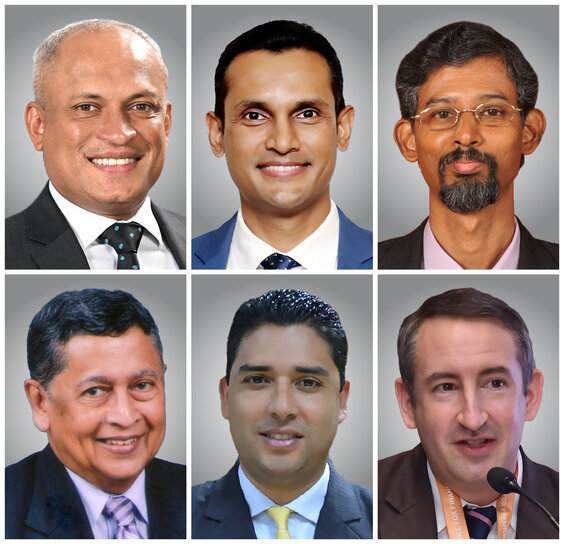The first in the series of webinars on “Money Matters – Financial Literacy and Capacity Development”, organized by the Lions Club of Colombo (Host) District 306A1 was successfully concluded recently, with the participation of a distinguished panel of speakers.
The session explored in detail about global and local financial literacy stats, role of financial inclusion as an enabler of Sustainable Development Goals (SDGs), key pillars of national financial inclusion strategy, role of financial regulators and financial institutions in onboarding people to the formal finance sector, how digitization can help in solving most of the problems faced within the finance sector, how to enhance financial literacy and thereby alleviate poverty and more interesting topics.
As a starting point to the session, Lion Asitha Pinnaduwa, Certified Expert in Financial Inclusion Policy and President – Lions Club Colombo Host 306A1 (2021-22), who moderated the session shared key statistics based on a global financial literacy survey done by Standard & Poor’s (S&P) and outlined that gap between financial literacy and book literacy. According to the survey data, Sri Lanka has achieved a 35% of financial literacy while the book literacy is around 90%. As per the National Financial Inclusion Survey 2018/2019 published by the Central Bank of Sri Lanka, despite a 90% account ownership only 41% of the respondents reported any borrowing during the last 12 months. He also raised concerns regarding the high percentage of people still dealing with financial services via informal sector such as money lenders (loan sharks), Unregistered Credit Providers, etc.
Mr. Robin Newnham, Head of Policy Analysis, Alliance for Financial Inclusion (AFI), emphasized that even though financial inclusion is not a core pillar of Sustainable Development Goals (SDGs), it plays a vital role as an enabler to achieve most of the goals. “Financial inclusion is positioned as critical enabler of many SDGs and you can even draw linkages to around 14 SDGs. Access to digital financial services can help solve a lot of problems related to SDGs such as poverty, industry, women empowerment and overall economic development.” He pointed out that developing countries need to swiftly initiate financial inclusion measures in order to come out of the economic struggles.
Mr. B L J Saliya Balasooriya, Director Regional Development Department of the Central Bank of Sri Lanka, explained the role of the CBSL and the newly formed National Financial Council to implement the national financial inclusion strategy, which is vital for the economic growth of the country. He also highlighted four pillars that need to be looked in driving the national financial inclusion strategy forward. “The four pillars for national financial inclusion strategy are digital finance framework, consumer protection, promoting SME finance, financial literacy and capacity development. We have already formed a separate group as an enabler to facilitate data, infrastructure, policy tools and enabling a favorable regulatory environment. They are working together to finalize the action plan to drive the national financial inclusion strategy forward.” He also talked about the misconceptions related to financial services that draw back people from accessing them. He pointed out that due to lack of knowledge on the benefits of formal finance sector, majority of people miss the opportunity to avail secure finance services. He was confident that the national financial inclusion strategy would play a major role in enhancing financial literacy around the country, given that measures are being already implemented to conduct financial literacy workshops, skills development programs, etc.
Mr. Thilak Piyadigama, CEO, SDB Bank provided a broad overview of the formal and informal finance sectors citing the fact that a lot of SMEs and MSMEs continue to use the informal finance sector for fulfilling financial services due to not keeping their finance records, etc. He emphasized the need to get more people involved in formal financial services and advantages of moving towards a digitalized financial system. “There are lot of things we can do if we go digital. Sri Lanka is one of the best countries in terms of digital infrastructure. However, there’s some work to be done in the onboarding process.” He went on to suggest a more flexible mechanism for onboarding people to the formal finance sector.
Mr. Ricardo Estrada representing Frankfurt School of Finance and Management, Germany as the Course Director, Certified Expert in Financial inclusion Policy, duly acknowledged Sri Lanka for becoming the 70th country to launch the national financial inclusion strategy. He also talked about the need for a collaborative effort from all sectors to achieve financial inclusion. “We need to understand that in order advance financial inclusion, all parties must collaborate. If you need to make a national level impact, you need to coordinate with all policy makers and the private sector. Thanks to technology, now we have more channels to access financial services.” He stressed the fact that financial literacy has the potential to get more people actively participate in financial services and help in their economic growth, future plans, decision-making, etc.
Lion Mahendra Amarasuriya, Ex Chairman of Commercial Bank of Ceylon and Past International President of Lions Clubs International highlighted about some of the social endeavors carried out by Lions to uplift the livelihoods of Sri Lankans. The Lions Club International has been playing a vital role in supporting people with micro financing. “The Lanka Lions Foundation continues to support local communities with micro financing opportunities. The main aim of the foundation is to help alleviate poverty at all levels.”
The first session of the webinar series on financial literacy and capacity development ended after enlightening the audience to a wealth of knowledge. The next session ‘Does Personal Finance Still Work in Our Changing Economy?’ will be hosted on Saturday, 07th August 2021 from 4.00 pm – 5.30pm.
Photo Caption
(First Row from Left) Thilak Piyadigama – CEO SDB Bank, Lion Asitha Pinnaduwa – Certified Expert in Financial Inclusion Policy and President – Lions Club Colombo Host 306A1 (2021-22), B. L. J. S. Balasooriya – Director Regional Development Department of the CBSL (Second Row from Left) Lion Mahendra Amarasuriya – Ex Chairman of Commercial Bank of Ceylon and Past International President of Lions Clubs International, Ricardo Estrada – Certified Expert in Financial Inclusion Policy – Frankfurt School of Finance and Management, Robin Newnham – Head of Policy Analysis, Alliance for Financial Inclusion (AFI)



Comment here